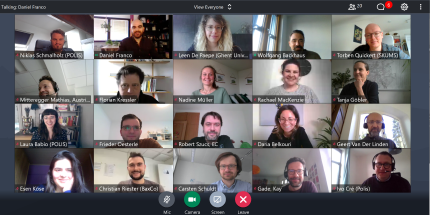CCAM in SUMP Workshop
- On 15 April 2021, the Dynaxibility4CE Project hosted a virtual workshop to review existent knowledge and guidance on effective planning for Cooperative Connected and Automated Mobility (CCAM). The event aimed to discuss current challenges and identify areas where further support is needed for public authorities to make informed decisions about CCAM.
The Dynaxibility4CE project understands that to steer the beneficial deployment of CCAM services, ensuring its alignment with sustainable urban mobility goals, local authorities will need to take a leading role. A proactive planning approach is required to effectively regulate how the introduction of Connected and Automated Vehicles (CAV) should unfold, minimise the potential negative impacts and, more importantly, make the most of the opportunity to influence the paradigm shift into a more sustainable urban mobility vision.
With this in mind, the workshop served to jointly review the Practitioner Briefing: Road-vehicle automation in sustainable urban mobility planning, authored by Rupprecht Consult in 2019, identifying knowledge gaps and challenges to be addressed. Moreover, recommendations and strategies towards automation-readiness, good practice examples and useful references were discussed, as input for the enhancement and further development of the publication into a SUMP Topic Guide

As a joint effort from the Interreg Central Europe project Dynaxibility4CE and the Interreg Northsea projects PAV and ART-Forum, the event counted with representatives from various partner cities and regional authorities, providing direct insights on challenges faced in their CCAM planning efforts and on their priority support needs.
Other participants included experts from academic and research organisations, consultants, NGOs, National Agencies, Public Transport Operators, and representatives from the European Commission. The interactive discussion approach allowed us to make the most of the diverse perspectives and areas of expertise among attendees, and to build cooperation agreements between the involved projects.
